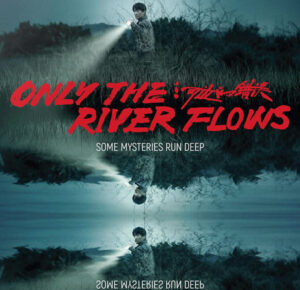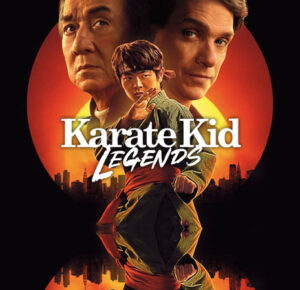
"Dragon The Master" UK DVD Cover
Director: Ray Woo
Writer: Ray Woo
Producer: Joseph Lai, Ricky Wong, George Lai
Cast: Dragon Sek, Karen Cheung, Roy Cheung, Edward So, Billy Chow Bei-Lei, Lily Chung, Huang Yang
Running Time: 89 min.
By Joseph Kuby
OK but no point!
Just to save you from watching this movie with no obvious preconception of what this movie is about, I’ll tell you the plot in a nutshell.
I know it’s called spoiling the plot but really this is the sort of film in which understanding the plot prior to watching it is essential – not because it’s a martial arts/action movie but because the plot is convoluted junk (not because having a complicated plot is automatically junk but because the film’s plot is convoluted and it’s of the junk variety).
I only read Jeff’s review and the one over at the “Bruceploitation is a crime” site so naturally watching this film didn’t prove to be too taxing (i.e. a chore).
The plot is that this woman called Shelly (played by an actress whose lack of experience as a screen actress {as stated in the DVD extras} shows as she looks at the camera sometimes, though this could be faulted due to the lack of direction and an inproper script than lack of thespian judgement) has invented this computer game which is supported by a fellow colleague called Ko Wei (played by Roy Cheung – who doesn’t seem to be enjoying himself, wishing for better material) though the company would rather bootleg her material than sell it earnestly (perhaps this is a metaphor of the Hong Kong film industry itself and media moguls everywhere to a certain extent).
Her game gets stolen by these two ninjas (supposedly the later mentioned female assassins) and then she enlists the help of her best friend Sherwood (a disco socialite junkie who’s in over her head and a bit ditzy, as well as being something of a clutz) and her brother, Bruce Lee lookalike, Ti Lung (named after the famous martial arts actor who appeared in John Woo’s A Better Tomorrow) who, for no other reason other than the fact that this is a Bruceploitation movie, first shows up dressed in a yellow catsuit akin to Bruce Lee from Game Of Death (the suit most people {outside of Asian cinema fan circles} associate with Uma Thurman in Kill Bill).
A sub-plot is introduced (which could have been handled with some depth as it merely alludes to such depth waiting to be explored) which involves a wayward kickboxer who hails from the countryside looking for a way to enter the local tournament (an event which is alluded to in the film but never happens – again, not due to unpredictable storytelling mechanics but due to lack of budget….in case you can’t tell, this isn’t a big budget movie in the Hong Kong sense nor in the general sense).
He gets taken in by the schools of Jackie Cheng and Dragon Sek but is eventually forced to leave both subsequently due to lack of discipline to tolerate the bullying antics of the students. His wife abandoned him due to his martial arts-oriented ways, now he’s looking for her, finds that she’s in hospital and needs a lot of money to save her for a life-threatening operation.
Money which is only partially provided by Ko Wei, who happens to be a long-time friend of the kickboxer and forces him to do stuff in order to get what he wants via emotional blackmail but Billy is so happy to see his friend and so relieved yet distraught to find his wife that he barely notices the seedy undertones of the whole shebang.
Shelly and Dragon’s brother get kidnapped as the game that was being sold to the bootleggers was false so Dragon is coerced to team up with unlikely assistants to get them back whilst Ko Wei constantly threatens Shelly to hand over the format of the game.
Sometimes, Billy Chow’s character is more sympathetic than Dragon Sek’s and this isn’t some kind of cleverly written irony or a three dimensional way to highlight and flesh out characterization as a way of saying everyone is good and bad, but it’s just simply bad screenwriting (i.e. inconsistent character portrayals).
Speaking of characterization, I wasn’t sure as to whether Shelly was a shy character or if it was due to the cluelessness (or shy/embarrassed) appearance of the actress playing her (but again, it’s probably down to the direction and scripting).
The Bruceploitation era ended years ago and they still haven’t improved much with their budgets & overall production finesse, so why did they bother NOW?
It’s an okay film in that it’s technically well made, a mildly competent film if not a good one.
There were continuity errors that I spotted in regards to the way a person looked during a transition from shot to shot. Also, there’s an error I found in which the boyfriend of one of the female protagonists (the female martial artist called Sherwood as played by Karen Cheng) has spotted the two females (who are looking for the bootleggers in this building) and is trying to hide from them yet the positioning of all three could never allow for him to spot them without himself being spotted (especially as he tries to run away).
The fight scenes could have been shot much better which is a shame as the choreography was almost on a Yuen Woo Ping level. At the very worst, the fight scenes are a poor man’s version of the stuff headed by Corey Yuen Kwai’s stunt team. At the very best, the fight scenes feel like Corey had a hand in them.
On the behind the scenes featurette, the fight scenes looked so much better, not just because they’re shot from a stationary camera where you can see the choreography reveal in front of your eyes without lots of close-up camera angles and too much fast editing, but because some of the footage that was shown was taken from the widescreen print of the film making you wish that the Western distributors had released the film in widescreen. Also, the film looks like something from the early 90s (due to quality of print) despite being made in 2003!
The best fight scenes are the ones which involved Dragon taking on the kart-driving assassins and the assassins on the first floor of the pagoda he enters at the very end of the film.
There’s only four other fight scenes which constitute as being the best leaving the others to look slightly average or poor in comparison: the introductory fight to the film which contains a nicely filmed stand-off beween two female opponents (for mainstreamers, this may recall the fight between Michelle Yeoh and Zhang ZiYi in Crouching Tiger Hidden Dragon), the fight between Dragon Sek and the drunken boxer (unashamedly called Jackie Cheng), the final fight at Dragon’s dojo (which sees Dragon, Karen and Jackie take on a duo of blackly-clad female assassins) and when Jackie takes on one of the main villains outside the pagoda.
In fact, whenever Billy Chow showed up on screen (the kickboxer from the countryside) the screen was set alight and his appearance raises this out of its B movie leanings in the same way Dorian Tan Tao Liang’s and Jim Kelly’s appearances lifted Black Belt Jones 2: The Tattoo Connection out of B movie limbo (Dorian’s presence for artistic reasons and Jim’s presence for commercial reasons); so naturally when Billy shows up the fight scenes are worth their salt.
Critically acclaimed actor Roy Cheung (who was in Johnnie To’s The Mission) was in this movie as well playing the love interest of Dragon’s sister (called Shelly) who originally sticks up for her idea of a computer game but who is really a shady entrepreneur trying to rip her off by selling the computer game to shifty bootleggers.
His appearance also lifts this from its B movie leanings though he’s wasted (like what he said on the behind the scenes featurette, there wasn’t much psychology written for the character).
It could have been left uncut too as there’s a scene featured in the making of documentary (though shot from a behind the scenes perspective) that involves the female martial artist and our Bruce Lee lookalike jogging with the latter’s students.
The guy who’s the Bruce Lee lookalike looks like a muscular and taller version of Teddy Robin Kwan (who played Boomer in Jackie Chan’s Twin Dragons) than Bruce Lee. Also, our Jackie Chan wannabe looks more like Manfred Wong (producer/screenwriter of The Duel, of whom can be seen on the UK DVD release of said film) than Jackie Chan (the only similarities are the hair and a big nose) and he’s incredibly dopey looking to boot.
Word has it that Disney wants Yuen Woo Ping to remake Seven Dwarfs & Snow White except with Shaolin monks in the leading roles, so this dopey JC wannabe is a pure candidate for the dopey monk!
It’s interesting how the story reflects Bruce’s original plans (and rewrites) for Game Of Death. Both of these movies (minus the 1978 version of Game Of Death) are about a retired martial arts champion whose sister and brother are kidnapped by the Korean mafia, thus forcing our hero to team up with unlikely assistants to battle opponents associated with a pagoda.
The idea, originally (i.e. before Bruce began shooting) was that on each floor there would be a group of martial artists of a particular style, in the case of the first floor – it is guarded by a group of staff-wielding thugs.
I wonder if these inspirations were intentional (no sarcastic pun intended) though I think with Bruce’s popularity in the East, it’s fair to say that the screenwriters are huge Bruce Lee fans and did their research (either casually as fans or formally as filmmakers looking for ideas).
In fact, I’d go so far to say that the film tries too hard to capture the essence of Bruce Lee’s films that it barely has its own identity (only a select few things from this film make it memorable, but only just); and by this I mean the contrived attempts to reference Bruce Lee’s classics i.e. Way Of The Dragon (the way Dragon dresses at the very end) and Enter The Dragon (the hideously contrived yet hilariously laughable attempt at revisiting Bruce Lee’s battle scars from the showdown of that film, as well as the idea of him fighting in an environment that threatens to overwhelm him).
The ending is really corny with Dragon doing a jump kick to stop the two main villains (who aren’t martial artists) in a slow motion one-take deal – he jumps really high in the air complete with cheesy facial expressions and a typical Bruce Lee-style war cry.
We never really find out if they rescued the siblings or not, though the assumption is that they did (something that could be down to leaving things left to the imagination or simply, yet once more again, lack of budget or lazy screenwriting).
Dragon The Master is really a bad film (regardless of the bad dubbing which makes this movie terrible) but one that remains to be essentially a guilty pleasure.
Needless to say, I had a fun time watching the Bruceploitation genre being revamped for the millennium for mainstream audiences to savour. The movie isn’t so bad that I won’t check out Dragon Sek’s future work as the guy has potential (plus his appearance in Big Boss Untouchable {a shot on video remake of Bruce Lee’s The Big Boss} sounds intriguing and looks cool, so nonetheless I’ll check that out sometime soon) but it’s still bad.
Joseph Kuby’s Rating: 5/10






















Be the 1st to Comment